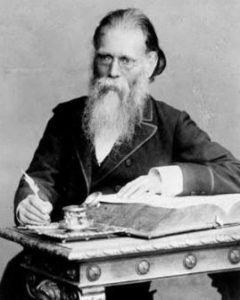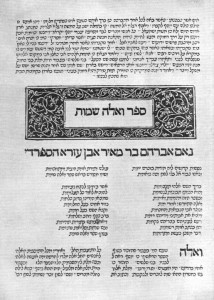Founder of the Jewish National Fund
 Zvi Hermann Hirsch Schapira (1840-1898) was born to a religious Russian-Jewish family in a small Lithuanian village. He studied to become a rabbi and at age 24 was appointed to his first post. However, he soon decided to pursue his passion for the sciences and ended up studying at a Berlin academy. Three years later, he settled in Odessa and worked for several years as a merchant. In 1878, Schapira moved to Heidelburg and spent another four years studying math and physics, during which time he earned his doctorate. He became a math professor at the University of Heidelburg, and published several important papers. Throughout this time, he continued studying Jewish literature, and contributed to three Hebrew periodicals. By 1884, Shapira was a vocal Zionist, and suggested the establishment of a Jewish National Fund which would buy land in Israel and help settle Jews there. He formally proposed the idea to the First Zionist Congress in 1897, where he also suggested the establishment of a Hebrew University in Jerusalem. Tragically, Schapira died the following year from pneumonia. The Jewish National Fund would finally be launched three years later, and it would take another two decades before the Hebrew University would open its doors. The JNF would go on to become one of the most important organizations in Israel’s history, and instrumental in the nascent state’s success. It purchased over 50% of Israel’s landmass, developed over 250,000 acres of its land, planted some 260 million trees, built nearly 200 dams and reservoirs, and established over 1000 parks. The JNF also played a key role in the founding of Tel Aviv in 1909, and in running Israel’s first postal service. It still owns about 13% of Israel’s land, and in the past decade alone, helped Israel expand its water capacity by 7%. The JNF is perhaps most famous for its Tu b’Shevat tree-planting drive, which over a million Jews participate in every year.
Zvi Hermann Hirsch Schapira (1840-1898) was born to a religious Russian-Jewish family in a small Lithuanian village. He studied to become a rabbi and at age 24 was appointed to his first post. However, he soon decided to pursue his passion for the sciences and ended up studying at a Berlin academy. Three years later, he settled in Odessa and worked for several years as a merchant. In 1878, Schapira moved to Heidelburg and spent another four years studying math and physics, during which time he earned his doctorate. He became a math professor at the University of Heidelburg, and published several important papers. Throughout this time, he continued studying Jewish literature, and contributed to three Hebrew periodicals. By 1884, Shapira was a vocal Zionist, and suggested the establishment of a Jewish National Fund which would buy land in Israel and help settle Jews there. He formally proposed the idea to the First Zionist Congress in 1897, where he also suggested the establishment of a Hebrew University in Jerusalem. Tragically, Schapira died the following year from pneumonia. The Jewish National Fund would finally be launched three years later, and it would take another two decades before the Hebrew University would open its doors. The JNF would go on to become one of the most important organizations in Israel’s history, and instrumental in the nascent state’s success. It purchased over 50% of Israel’s landmass, developed over 250,000 acres of its land, planted some 260 million trees, built nearly 200 dams and reservoirs, and established over 1000 parks. The JNF also played a key role in the founding of Tel Aviv in 1909, and in running Israel’s first postal service. It still owns about 13% of Israel’s land, and in the past decade alone, helped Israel expand its water capacity by 7%. The JNF is perhaps most famous for its Tu b’Shevat tree-planting drive, which over a million Jews participate in every year.
Happy Tu b’Shevat!
Words of the Week
When God created the first man, He showed him all the trees of the Garden of Eden, and said to him: “See My works, how beautiful and praiseworthy they are. And everything that I created, I created it for you. Be careful not to spoil or destroy My world, for if you do, there will be nobody after you to repair it.”
– Midrash (Kohelet Rabbah 7:13)

 Gerhard Scholem (1897-1982) was born to a secular Jewish family in Berlin. At a young age he showed a great interest in religion, but his father was staunchly anti-Orthodox and opposed it. After his mother intervened, Scholem was allowed to study Judaism with an Orthodox rabbi. In university, he studied mathematics, philosophy, and Hebrew, and met other greats like Martin Buber and Hayim Bialik. He later received an additional degree in Semitic languages. During his studies, he discovered Kabbalah and the infinite depths of Jewish mysticism. He ended up writing his doctoral thesis on the oldest known Kabbalistic text, Sefer ha-Bahir. In 1923 Scholem moved to Israel and changed his name to Gershom. He worked as a librarian and spent his time in study. In 1933 he became the first Professor of Mysticism at the Hebrew University of Jerusalem, teaching a unique view of Kabbalah from a scientific and historical perspective. He stayed at this post for over 30 years, while writing over 40 world-famous texts (in addition to over 700 articles) and winning a handful of prestigious awards, including the Israel Prize. He is credited with being a major force in opening the study of Kabbalah to the masses, both Jews and Gentiles. Despite studying Judaism through a scholarly approach, he maintained that Hebrew is a divine language, alone capable of revealing hidden truths.
Gerhard Scholem (1897-1982) was born to a secular Jewish family in Berlin. At a young age he showed a great interest in religion, but his father was staunchly anti-Orthodox and opposed it. After his mother intervened, Scholem was allowed to study Judaism with an Orthodox rabbi. In university, he studied mathematics, philosophy, and Hebrew, and met other greats like Martin Buber and Hayim Bialik. He later received an additional degree in Semitic languages. During his studies, he discovered Kabbalah and the infinite depths of Jewish mysticism. He ended up writing his doctoral thesis on the oldest known Kabbalistic text, Sefer ha-Bahir. In 1923 Scholem moved to Israel and changed his name to Gershom. He worked as a librarian and spent his time in study. In 1933 he became the first Professor of Mysticism at the Hebrew University of Jerusalem, teaching a unique view of Kabbalah from a scientific and historical perspective. He stayed at this post for over 30 years, while writing over 40 world-famous texts (in addition to over 700 articles) and winning a handful of prestigious awards, including the Israel Prize. He is credited with being a major force in opening the study of Kabbalah to the masses, both Jews and Gentiles. Despite studying Judaism through a scholarly approach, he maintained that Hebrew is a divine language, alone capable of revealing hidden truths.